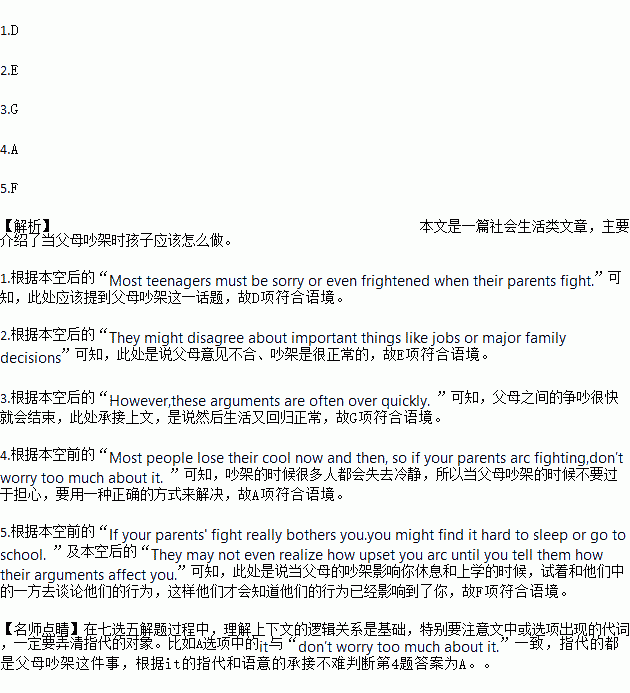题目内容
Maybe you often have arguments with your parents about clothes, homework, friends and many other personal things.1.Most teenagers must be sorry or even frightened when their parents fight. They might think their parents don't love each other any more and that it would result in divorce.
2.They might disagree about important things like jobs or major family decisions. They might even disagree about little things that don’t seem important at all—Like what’s for dinner or what time someone gets home. Maybe sometimes parents can feel so strongly about their differences that it may lead to arguments. However, these arguments are often over quickly.3.
As a family member, you should find out what it really means when your parents fight. When your parents get upset with each other, they might cry or say things they don’t really mean. Most people lose their cool now and then, so if your parents arc fighting, don’t worry too much about it.4.
If your parents' fight really bothers you, you might find it hard to sleep or go to school.5.They may not even realize how upset you are until you tell them how their arguments affect you. You can also tell other relatives, a teacher or a friend.
Just remember that no family is perfect and arguments are common in every family.
A. Try to find a good way to solve it.
B. Parents might fight over small things
C. You should never argue with your parents.
D. But what’s going on when your parents fight with each other?
E. In fact, it is normal for parents to disagree and argue from time to time.
F. If this happens, try talking to one or both of your parents about their behavior.
G. Parent may apologize and make up and the family gets back into its usual way.
 阅读快车系列答案
阅读快车系列答案
| Guitar lessons Your home or mine. Call Larry at 6087593. |
| Lost dog |
| Taxi driver wanted. Full time. Experience and good knowledge of the city are necessary. Under 45 years old. Call Mr. White at 5132633 or 13935728866. |
| Apartment for sale Two bedrooms, a kitchen and a bathroom. Hot water 8:00 - 18:00. Beautiful sights out of the windows. E-mail: sdgt@ 163.com. |
1.Who can teach children to play the guitar?
A. David. B. Larry.
C. Mr. White. D. Susan.
2.Which number should you call at if you find the lost dog?
A. 6087593. B. 5132633.
C. 7328059. D. 13935728866.
3.Which of the following people may get the job as a taxi driver?
A. A 50-year-old person.
B. A person who has just got his driver’s license.
C. A 40-year-old person who can drive well in the city.
D. A person who can drive and has free time on weekends.
4.When is hot water provided in the apartment according to the ad?
A. At night. B. In the daytime.
C. At any time. D. Only in the afternoon.
5.How can you contact the owner of the apartment for more information?
A. By making a phone call. B. By going to visit it.
C. By sending a letter. D. By sending an e-mail.





